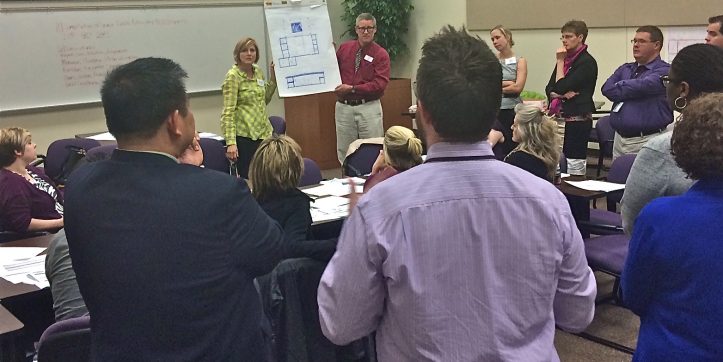Planning begins for future fine arts center

The AISD began planning for the bond-funded future districtwide fine arts center with a two-day planning lab. Led by Kerianne Wolf, an educational consultant with DeJONG-RICHTER, participants in the lab included AISD fine arts teachers, students, administrators and parents.
The all-day sessions kicked off Monday morning, April 26, with a flute solo by Crystal K., a senior at Martin High School who will attend Vanderbilt University next year to continue her music studies. Then Cindy Powell, AISD chief financial officer, introduced the vision for the fine arts center and asked, “What can we do to offer world class experiences that we can’t today?” She also emphasized that this facility will provide relief to the high schools dealing with overcrowding and allow the district to enhance its fine arts program offerings.
Dr. Marcelo Cavazos, AISD superintendent, also stopped by to thank the participants. He acknowledged the hard work it takes to plan and develop a new facility like this, but also encouraged everyone to take joy in the process. “You’re designing something that will serve students for generations to come,” he said. “This is a tremendously unique time in Arlington.”
Wolf, the lab facilitator, echoed Dr. Cavazos. “This is truly unique,” she said. “Fine arts is getting the attention it truly deserves.” DeJONG-RICHTER works in 46 states, she explained, and she knows from experience that this type of emphasis and attention on fine arts is exceptional and uncommon across the country.
Wolf, who had already met with and interviewed many of the teachers, encouraged deep thought and discussion among the participants to develop the vision and educational specifications for the future fine arts center. The point of the facility is to enrich the arts instruction the district currently has and provide opportunities it currently does not. “How do we create a facility that actually enhances what we do?” Wolf asked.
The fine arts center will include a concert hall, classroom space, an instrument repair center and gallery space. It will be available for all district fine arts programs, kindergarten through grade 12.
“This is a growth model,” Jeremy Earnhart, AISD director of fine arts, stressed. The district’s aim is to increase student participation in fine arts and create world-class, student-centered programs accessible to every student. The AISD is using the 2014 Bond package to make that possible by eliminating instrument fees and improving and adding fine arts spaces.
On the first day of the lab, the participants were often broken into small groups to discuss the potential for this facility, along with the challenges and opportunities. On the second day they began to get more specific. The participants divided into groups based on their area – theater, music, dance and visual arts. They discussed the types of spaces they will need and imagined what their ideal space might look like. They also considered how the different art programs could share and leverage common resources and spaces. By the end of the day, each group illustrated on large sheets of paper their vision of an ideal floor plan and shared them with the entire group.
Following the first planning lab, AISD administrators sought input from industry representatives and fine arts experts, including representatives from the Amon Carter Museum, Casa Mañana, the University of Texas at Arlington, the Arlington Museum of Art, the University of North Texas College of Music and Miss Persis Studio and Dance Theatre of Arlington. They provided insight and offered many thoughts to consider in the design, from making sure the doors are large enough to allow for large pieces of art to getting the acoustics and lighting just right in the auditorium.
The district also sought input from the community with a public meeting on Monday, May 4. Wolf led the meeting, presented what came out of the planning lab and asked for feedback. An online survey was then available for the week following the meeting for anyone in the community to offer input.
Once the community input was reviewed, Wolf compiled a report with the responses, along with all the information from the planning lab. She then led a second planning lab with the same participants on May 21 to develop more specific, detailed educational specifications. The educational specifications will help the architect design the building.
